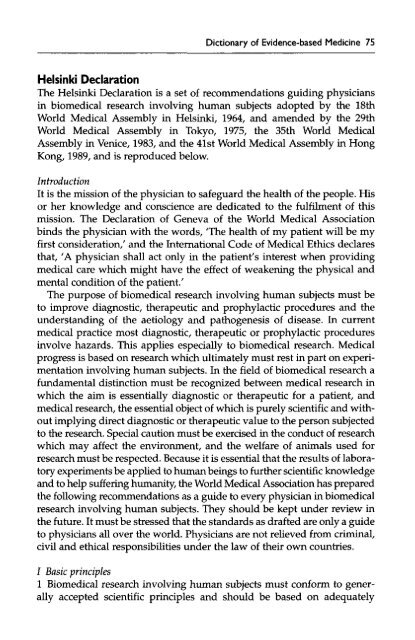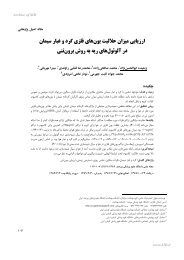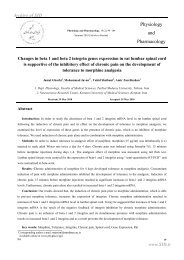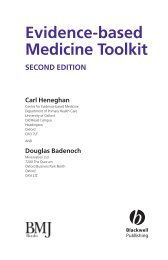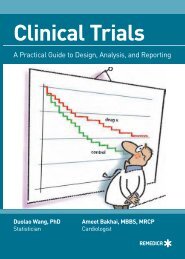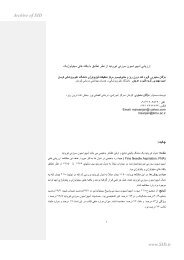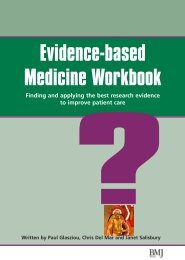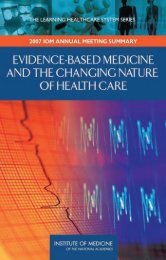Dictionary of Evidence-based Medicine.pdf
Dictionary of Evidence-based Medicine.pdf
Dictionary of Evidence-based Medicine.pdf
Create successful ePaper yourself
Turn your PDF publications into a flip-book with our unique Google optimized e-Paper software.
<strong>Dictionary</strong> <strong>of</strong> <strong>Evidence</strong>-<strong>based</strong> <strong>Medicine</strong> 75<br />
Helsinki Declaration<br />
The Helsinki Declaration is a set <strong>of</strong> recommendations guiding physicians<br />
in biomedical research involving human subjects adopted by the 18th<br />
World Medical Assembly in Helsinki, 1964, and amended by the 29th<br />
World Medical Assembly in Tokyo, 1975, the 35th World Medical<br />
Assembly in Venice, 1983, and the 41st World Medical Assembly in Hong<br />
Kong, 1989, and is reproduced below.<br />
Introduction<br />
It is the mission <strong>of</strong> the physician to safeguard the health <strong>of</strong> the people. His<br />
or her knowledge and conscience are dedicated to the fulfilment <strong>of</strong> this<br />
mission. The Declaration <strong>of</strong> Geneva <strong>of</strong> the World Medical Association<br />
binds the physician with the words, 'The health <strong>of</strong> my patient will be my<br />
first consideration/ and the International Code <strong>of</strong> Medical Ethics declares<br />
that, 'A physician shall act only in the patient's interest when providing<br />
medical care which might have the effect <strong>of</strong> weakening the physical and<br />
mental condition <strong>of</strong> the patient.'<br />
The purpose <strong>of</strong> biomedical research involving human subjects must be<br />
to improve diagnostic, therapeutic and prophylactic procedures and the<br />
understanding <strong>of</strong> the aetiology and pathogenesis <strong>of</strong> disease. In current<br />
medical practice most diagnostic, therapeutic or prophylactic procedures<br />
involve hazards. This applies especially to biomedical research. Medical<br />
progress is <strong>based</strong> on research which ultimately must rest in part on experimentation<br />
involving human subjects. In the field <strong>of</strong> biomedical research a<br />
fundamental distinction must be recognized between medical research in<br />
which the aim is essentially diagnostic or therapeutic for a patient, and<br />
medical research, the essential object <strong>of</strong> which is purely scientific and without<br />
implying direct diagnostic or therapeutic value to the person subjected<br />
to the research. Special caution must be exercised in the conduct <strong>of</strong> research<br />
which may affect the environment, and the welfare <strong>of</strong> animals used for<br />
research must be respected. Because it is essential that the results <strong>of</strong> laboratory<br />
experiments be applied to human beings to further scientific knowledge<br />
and to help suffering humanity, the World Medical Association has prepared<br />
the following recommendations as a guide to every physician in biomedical<br />
research involving human subjects. They should be kept under review in<br />
the future. It must be stressed that the standards as drafted are only a guide<br />
to physicians all over the world. Physicians are not relieved from criminal,<br />
civil and ethical responsibilities under the law <strong>of</strong> their own countries.<br />
/ Basic principles<br />
I Biomedical research involving human subjects must conform to generally<br />
accepted scientific principles and should be <strong>based</strong> on adequately


